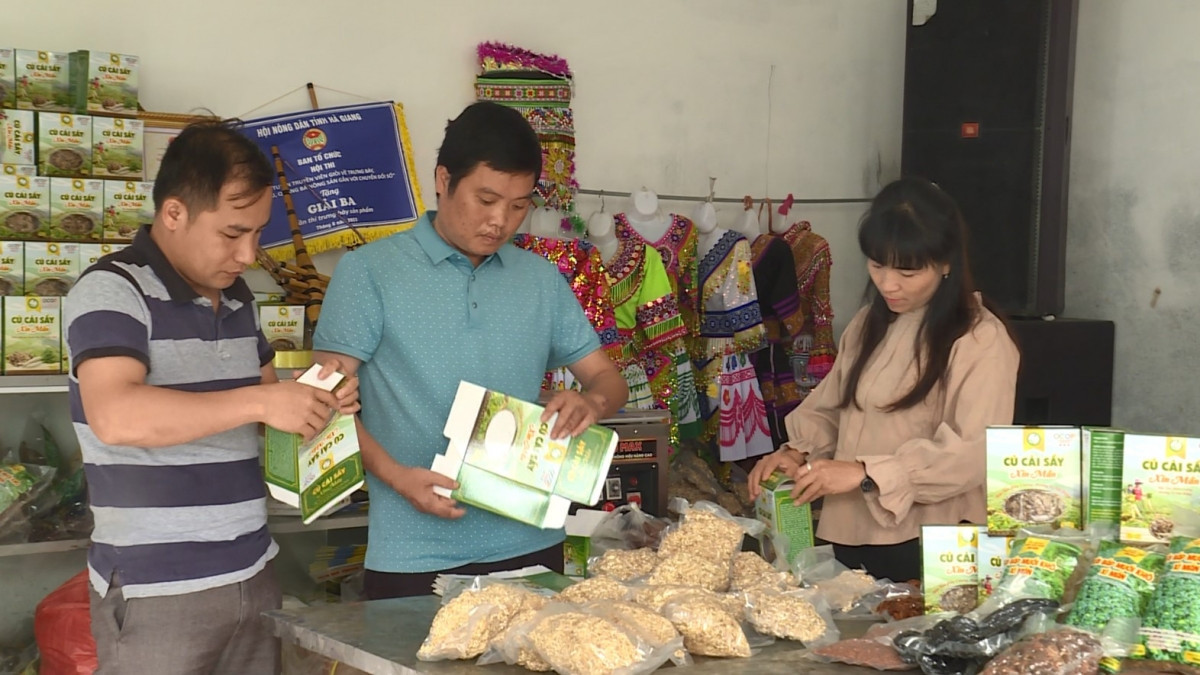
The Quan Ba Community Tourism Cooperative in Quan Ba commune, Quan Ba district was established in 2021 with 24 members. Thanks to support policies of the Ha Giang Provincial Cooperative Alliance, the cooperative has chosen a production and business plan suitable for the resort tourism market in Ha Giang province.
Community-based tourism, which explores traditional cultural features, has helped resort activities in Quan Ba become an attractive destination for domestic and foreign tourists. The cooperative earns a yearly revenue of more than 3 billion VND, and its members are paid 7 million VND of monthly salary.
The cooperative economy has opened up sustainable opportunities for many people in Quan Ba commune. Mr. Nguyen Do Muoi, Director of the Quan Ba Community Tourism Cooperative, said: "Nam Dam Village has a lot of potential to develop community-based tourism. Our cooperative also calls on members who are doing homestays to gather to become a cooperative in a bid to help community-based tourism in Nam Dam village develop in a sustainable way."
In Ha Giang province, Quan Ba district is considered a pioneer in implementing the cooperative economy and the model of cooperative groups. After converting to a new cooperative model according to the 2012 Law on Cooperatives, most cooperatives in Quan Ba have experienced good changes. The implementation of many new economic models such as general tourism, service trade, cattle raising, and traditional craft development has helped thousands of local cooperative members have a stable life and can get rich.
The Hoa An Tea Cooperative, located in Phuong Do commune, Ha Giang city, was established in 2008. It currently has 10 members. To produce tea products based on the value chain, the cooperative has linked production and consumption of Shan Tuyet tea with over 100 households. With a raw material area of over 80 hectares that has been recognized for organic standards, with natural incentives, the cooperative's tea area is Ha Giang’s precious Shan Tuyet tea farming area. The cooperative's tea products are also exported to China. Each year the cooperative earns a revenue of 5-7 billion VND, creating jobs for 20 workers and uses tea materials of farmers in Phuong Do and Phuong Tien, and Thanh Duc communes.
According to the cooperative's leaders, collective economic activities linked based on the value chain will help tea farmers have a stable life and be able to get rich from growing specialty Shan Tuyet tea.
The Xin Man Agriculture and Forestry Cooperative, based in Xin Man commune, Xin Man district with the profession of producing and processing pickled turnips, organic vegetable products and trading organic agricultural products has successfully implemented a chain of production and deep processing of turnips with many refined product lines that are well consumed in the local market. The cooperative has a revenue of over 10 billion VND per year, and members' salaries reach 7 million VND/person/month. In addition, to have sufficient raw materials, the cooperative has cooperated with local farmers to grow over 10 hectares of turnips.
Xin Man district currently has 52 cooperatives operating in the fields of agriculture and forestry, general commercial services, construction, construction material production, livestock, poultry, and aquaculture, employing more than 2,000 members. Many cooperatives carry out production chains, helping to increase the added value and income of farmers by 1.5 to 2 times compared to conventional production methods.
Overall, Ha Giang province has more than 800 cooperatives with over 22,000 members and a total charter capital of over 1,160 billion VND, and the average charter capital of 1.4 billion VND/cooperative. These cooperatives create regular jobs for over 10,500 people, with the average income of workers reaching 40 million VND/person/year. The number of employees working regularly in cooperative groups is more than 25,000 people.
In recent years, the collective economy, with cooperatives as the core, has had positive changes, developing more stably and sustainably. The newly established cooperatives generally comply with the provisions of the Cooperative Law, with cooperative members participating voluntarily, who are not only individuals and households but also farm owners, small production and business establishments.
Ms. Lo Thi My, Chairwoman of the Ha Giang Provincial Cooperative Alliance, said that in the coming time, the Alliance will focus on vocational training for workers, combining training and fostering for heads of cooperatives; on keeping abreast of reality and in accordance with market development requirements.
At the same time, it will increase support and encourage cooperatives to participate in building models associated based on the value chain; Actively launch and respond to emulation movements to develop cooperatives. The unit also aims to build more collective economic models, production based on the value chain, thereby creating jobs, increasing income, and contributing to sustainable poverty reduction for local people.